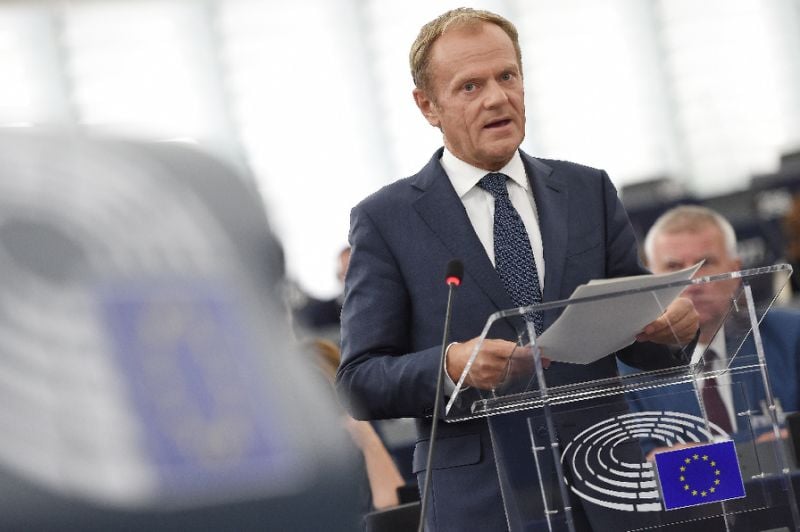
Tusk said the negotiations on Britain's withdrawal from the European Union were reaching a "decisive phase", as he opened the first of three summits that Brussels hopes will end in a divorce deal.
But while he had some encouragement for the "positive evolution" of Britain's approach, he warned the two sides were still stuck on two key areas — the Irish border and the future economic relationship.
"On other issues such as the Irish question, or the framework for economic cooperation, the UK's proposals will need to be reworked and further negotiated," Tusk said.
After quitting, Boris Johnson says Brexit 'dream is dying'
May will get a chance to address EU leaders at a dinner later Wednesday at the informal summit in the Austrian city of Salzburg, before a full day of talks on Thursday dominated by Brexit and the migration crisis.
Before setting off, her Downing Street office suggested that after she put forward new Brexit proposals this summer, it was now for Brussels to "evolve" its position.
Officials on both sides of the Channel hope Salzburg will give new impetus to divorce negotiations ahead of a crunch summit in Brussels on October 18.
That was originally viewed as the deadline, but Tusk confirmed on Wednesday he will seek approval from EU leaders for a last-gasp Brexit gathering in mid-November.
But first the issue of the border must be settled, with both camps coming up against their "red lines".
If it is not resolved, the chances of Britain stumbling into a chaotic and damaging break-up with its neighbours and main trading partners next March will soar.
Salzburg's host, Austrian Chancellor Sebastian Kurz, said it was important for the 27 non-British members to stick together.
In an interview with Austrian newspaper Der Standard, he warned that finding a solution before November "would be anything but easy".
Neither side wants a "hard border" to spring up between Northern Ireland, a British-ruled province, and the Irish Republic when London splits from the EU single market and customs union, as this would hurt trade and might undermine the Good Friday peace agreement.
But Europe is insisting on a "backstop" that would keep Northern Ireland in the customs union under EU rules while a future trade relationship is negotiated.
London sees this as a threat to its sovereignty and refuses to countenance a de facto Irish Sea frontier.
Post-Brexit: Britain aims to raise exports
"Neither side can demand the unacceptable of the other, such as an external customs border between different parts of the United Kingdom, which no other country would accept if they were in the same situation," May wrote in an editorial carried in several European newspapers.
Speaking in Brussels on the eve of Wednesday's summit, Europe's chief Brexit negotiator Michel Barnier was at pains to appear conciliatory, even if his proposition differed little from the long-standing EU position.
Specifically, he said that he would "clarify" which goods will have to be checked by customs officers as they are transported between mainland Britain and Northern Ireland.
"We can also clarify that most checks can take place away from the border, at the company premises or in the market," he said. "We need to de-dramatise the checks that are needed."
May's parliamentary majority depends on support from Northern Ireland loyalists bitterly opposed to any weakening of links with the UK and she faces a difficult Conservative Party conference at the end of month.
Officials say that 80 per cent of the divorce settlement is agreed, but that progress must be made quickly on Ireland and on the parallel political statement that will lay out a blueprint for future relations.
London wants a detailed outline of future trade ties in exchange for paying billions of euros the EU says it is owed in dues.
Brussels appears ready to fudge a plan to at least get the UK departure from the bloc out of the way, although this may not be acceptable to May's restive MPs at home.
A November deal would still give the British, European and member state parliaments enough time to debate and ratify the terms before March 2019, when Britain would otherwise crash out without a plan.

















COMMENTS
Comments are moderated and generally will be posted if they are on-topic and not abusive.
For more information, please see our Comments FAQ